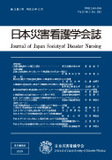Japanese
English
- 有料閲覧
- Abstract 文献概要
- 参考文献 Reference
- サイト内被引用 Cited by
要旨
目的:被災しながら活動した救援者の災害急性期におけるストレスフルイベントとストレスレベルを検討し、その特徴を明らかにする。
方法:新潟県中越地震で被災しながら保健、医療、救急業務に携わった職員317人を対象に、面接調査等から作成した災害ストレスフルイベント53項目の経験の有無とストレスレベル、勤務状況、被災状況等について質問紙調査を行った。分析には、Mann-WhitneyのU検定、相関係数等を用いた。調査期間は、2007年12月から2008年1月である。
結果:回収率80.8%。ストレスフルイベント経験者のストレスレベル(平均値4.5)は、組織、性別、住居変更の有無等において、有意差が認められた。また、ストレスフルイベント経験数とストレスレベル間において、中程度の正の相関(r=0.41)がみられた。「災害による近親者の死」、「知人、友人などの死」、「家族の安否が確認できないこと」、「発災後の対応を上司、同僚から非難されること」など10項目で、ストレスレベルは5.0以上を示した。
結論:被災しながら活動する現地の救援者にとって強いストレスとなり得る出来事の特徴は、近親者や親しい人の死、家族の安全が脅かされること、役割上の葛藤や個人の対応への非難などであることが示唆された。被災しながら活動する救援者のストレスを緩和するには、組織による支援が不可欠である。
Abstract
Objectives: The purpose of this study was to identify the relations and difference between stressful events and stress levels experienced by healthcare workers in devastated areas in the early stages of disasters.
Method: For the study, 53 items describing stressful events experienced in the early stages of disasters were developed based on descriptive research and literature review. A total of 317 healthcare personnel who had lived through the 2004 Niigata-Chuetsu Earthquake in Japan completed the questionnaire, which addressed their experience of these events, stress levels, working conditions and details of damage. Mann-Whitney U testing and a correlation coefficient approach were used, and data were collected from December 2007 to January 2008.
Results: The questionnaire response rate was 80.8%, and stress levels showed a positive correlation with the number of stressful events(r = 0.41). Additionally, stress levels(mean: 4.5)resulting from stressful events differed significantly among organizations, between males and females, and between people living in temporary shelters and those living elsewhere. Respondents also evaluated 10 events that caused extreme levels of stress, each of which was 5.0 points above the mean value. These included the death of family members and associates, uncertainty over the safety and well-being of family members due to a lack of reliable information, and criticism of respondents' work efforts.
Conclusion: The results of the research helped to clarify factors involved in the stressful events experienced affected workers in the early stages of disasters. The data also highlight-ed that death or danger to responders' family members, harsh criticism of their work and role conflicts were significant problems in the acute phase of disasters. From this, it can be concluded that healthcare personnel affected by disasters need support from the organiza-tions by which they are employed in order to keep working effectively.
Copyright © 2013, Japan Society of Disaster Nursing All rights reserved.


